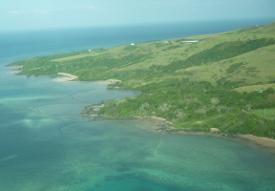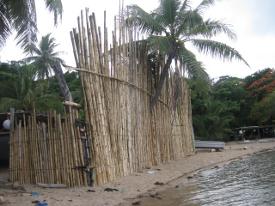

Climate adaptation
Climate change adaptation in the Torres Strait


A recent project, funded by the Australian Government's Marine and Tropical Sciences Research Facility, has explored how local, traditional ecological knowledge and practices are facilitating adaptation to climate change in the Torres Strait. The region, a group of over 100 islands that spread beyond 48,000 km², holds a unique set of histories, traditions and customs.
While holding a special significance in the protection of Indigenous Australian culture and land rights, the Torres Strait is also gaining visibility as a result of changing weather patterns, high tides and other inundation events linked to climate change.
Ecological knowledge in the Torres Strait
Researchers (from James Cook University) worked with Elders and Aunties in one community in the Torres Strait (Erub Island) to synthesise local, traditional ecological knowledge.
This knowledge included observations and details of: wet and dry seasons; wind patterns; bird nesting and migration patterns; hunting, planting and cropping times; sea life and fishing movements; and Tagai star constellation movements.
Experiences of climate change (including extreme events) and knowledge of how to adapt to biophysical changes in the environment were also captured. Islanders' ability to identify indicators and 'read' their land and sea country is important in maintaining livelihoods, culture and the environment, and build overall community resilience.
Resilience in knowledge
Local ecological knowledge is a valuable asset in observing and managing environmental change. Torres Strait Islanders have long been managing their land and sea country, and adapting to biophysical changes in their local environment for centuries.
With changes now occurring at unprecedented rates, the ways in which Islanders have adapted (in the past and present) can assist in planning for culturally-appropriate strategies in the future.
Islanders identified the following 'hard' tangible adaptation strategies to cope with changes:
- Use local natural materials to build houses, rock walls and wind breaks;
- Re-vegetate sand cays and island foredunes with local native species and re-establish mangroves to combat erosion; and
- Maintain fish traps and revive community gardens, which connect with past practices that diversify livelihood options.
Islanders also identified the following 'soft' indirect adaptation measures, which generate community resilience and greater self-sufficiency:
- Develop and strengthen social capital, especially women working together;
- Read' and respect country to gauge changes and generate sustainable responses; and
- Commitment from Elders to transfer knowledge and laws to the younger generation.
Local, traditional knowledge is already facilitating both 'hard' and 'soft' adaptation to climate change in the Torres Strait, thus demonstrating the resourcefulness of such knowledge and how it can facilitate adaptation and build community resilience.
Local communities should drive decisions concerning adaptation, and draw on their local resources and knowledge in order to promote the ownership of locally-appropriate responses.
If you would like to find out more, please contact Karen McNamara at [email protected]

More information...
Copyright © Green Cross Australia | Terms & Conditions | Privacy Policy
web design brisbane :: (zero)seven
